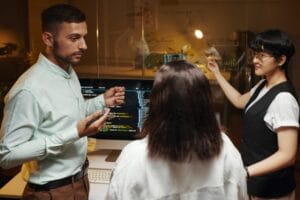By now you’ve probably already heard about artwork or text created by artificial intelligence. As we enter a new era of creativity, machines are progressively producing more and more creative works.
It’s exciting to see what these machines can create and what this technology can do, but there are some downsides as well. While there’s no doubt that the use of artificial intelligence will only continue to grow, there will surely be challenges to overcome. Computer-generated works have already raised many legal concerns, particularly their ownership and the possibility of infringement.
Although we haven’t reached that point yet, sooner than later, it will be necessary to determine what type of protection should be given to works created by artificial intelligence, whether it’s with human intervention or without.
Table of Contents
ToggleCan AI-Generated Work Be Copyrighted?
According to US law, copyright protection is granted only to work that is original and produced by a human author. Machine-generated works are currently not protected by copyright. However, it’s likely that in the coming years, artificial intelligence will have a significant impact on copyright law.
As long as you are the original author of a piece of AI code that you have written, your code is protected under copyright. In contrast, while that software code is protected by copyright, its results aren’t necessarily.
That means using AI-generated content, especially if you would like to for commercial purposes, has risks associated with it. Being that it was not made by a human, copyright does not apply and it is public domain by default. As far as copyright is concerned, anyone can use it without penalty and you cannot claim infringement.
In the past, copyright for AI-generated content was not an issue mainly because these machines functioned more like assistive devices rather than as creators. But now, the role of AI is changing, as these machines are now able to make many creative decisions without human involvement.
As it stands, copyright law only protects “the fruits of intellectual labor” that “are founded in the creative powers of the [human] mind”.
Will this change? There is still no clear answer at the moment.
Can You Use Copyright-Protected Data To Train AI Software?
The majority of these machines are trained using data gathered from the Internet. This content includes code, text, and images from digital galleries, blogs, and photo libraries.
The question is, is doing that actually legal?
While at the moment there is also no answer to whether this is legal or not, artificial intelligence professionals, businesses, and industry players in the US justify that collecting and using this data is protected by the fair use doctrine, a legal doctrine that promotes freedom of expression by encouraging the use of copyright-protected works.
There are several factors to consider when determining if something is fair use. Its purpose or nature, as well as how it affects its market value, are two of the most important ones. Is the new work different from the original work or does it completely transform it? What effect does it have on the original work’s value?
While it’s likely that systems that use copyrighted data will be protected by fair use, similar protection might not apply to the content it generates. So, that means that even though you can use that data to create content, you might be infringing on someone’s copyright if you sell it or use it for commercial purposes.
If You Need a Consulting Regarding Artificial Intelligence and Copyright, Sanchelima & Associates Can Help
Sanchelima & Associates, P.A. is one of the leading intellectual property law firms in South Florida. With over 40 years of experience, we have represented the IP interests of a wide array of businesses in the US and abroad, including Fortune 500 companies. Whether you need a consultation or prosecution of a patent, trademark, or copyright, we can protect your business’s interests.
Contact us to book your consultation!


